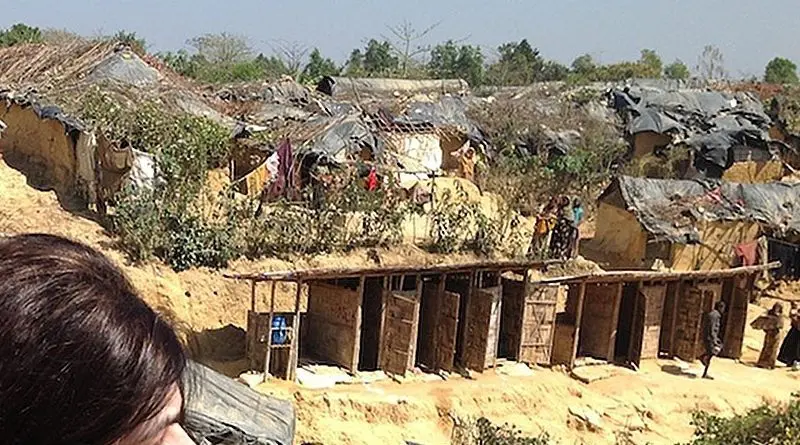Rohingya Crisis: UNGA President Reiterates Concern For ‘Arakan Muslims’ – OpEd
Recently president of the UN General Assembly Volkan Bozkir accompanied with Turkey’s ambassador to Bangladesh Mustafa Osman Turan visited Rohingya settlements in Cox’s Bazar to see the condition of the persecuted people in the world’s largest refugee camp on 26 May 2021. He visited the camp when intensifying turbulence in Myanmar following a military coup has made the peaceful repatriation of Rohingya refugees up in the air. He articulated his satisfaction over the arrangements for Rohingyas in Bangladesh especially applauded the Bhashan Char project for Rohingya refugees and praised the role of the country in a tweet after returning from the visit.
On the other hand, in an interview on May 24, the military chief of Myanmar Min Aung Hlaing cast doubt over repatriating people whom they do not consider as Myanmar citizens. Both of the statements of the UNGA head and that of Tatmadaw General are important for Bangladesh because the country is desperately looking for launching the repatriation process of the “Arakan Muslims” as soon as possible. The Prime Minister of Bangladesh Sheikh Hasina expressed apprehension to the visiting president of UNGA about how the coup d’état in February had affected the prospect of repatriating the Rohingya refugees.
Bangladesh is currently sheltering approximately 1.2 million stateless Rohingya refugees most of whom fled after the massive brutal military crackdown in Rakhine in August 2017. According to a report published by Ontario International Development Agency (OIDA), nearly 24,000 Rohingya people have been killed, over 34,000 were thrown into fires, more than 114,000 others beaten, approximately 18,000 women and girls raped, and as many as 115,000 homes burned down since the “genocidal intent”. To make it worse, the viciousness against the Rohingya refugees continues and at least 15 Rohingya Muslims including nine children have died since January this year, the Burmese Rohingya Organisation UK (BROUK) said. The UN has already declared the gross human rights violation against the Rohingya community as a “textbook example of ethnic cleansing”. But the Myanmar’s junta leader Min Aung Hlaing is playing dump and deaf to the international norms and rules concerning human rights of the Arakan Muslims. Recently in an interview with Chinese-language Phoenix television since the coup took place in the first week of February, Hlaing echoed the position of Myanmar of unrecognizing Rohingya Muslims as citizens of the country. The official posture of Myanmar since the crackdown in 2017 remains same supporting the ethnic cleansing which can be marked as a black spot in the development regarding the Rohingya crisis.
It is really pathetic that four years have passed but the 1.2 million forcibly displaced Arakan Muslims remain stateless and hanging in different camps in Bangladesh. The Bangladesh government initiated a project to relocate 100,000 Rohingya refugees to Bhashan Char to ease on the clumsy camps in Cox’s Bazar area. About 18,500 Myanmar’s minority Muslims have been shifted to Bhashan char in six phases since December 4 last year. Though the UN and some other humanitarian organizations have opposed the relocation process, the UN is finally going to be involved in providing humanitarian assistance to the Rohingyas in Bhashan char within the next two months. The Rohingya refugees staying in Cox’s Bazar or in the Bhashan Char desperately wants to return to their homeland. However, after the military coup, the complexity over Rohingya repatriation is snowballing and the process is still in stalemate.
In the early days of the coup, when there was tremendous international pressure on the Myanmar Military, the military chief told that the repatriation process will not be hampered, however, after his interview on the Chinese media on 24 May, it is clear that the Tatmadaw will continue to dawdle in repatriating the Rohingya refugees. Bangladesh has been trying to use all the diplomatic manoeuvres in the bilateral, trilateral and multilateral levels to find a sustainable solution of the protracting refugee problem. The UN, ASEAN and China need to play active role in solving the crisis because the dealy of the repatriation will escalate the socio-economic and security concerns of South Asia that has a far-reaching implication on the regional security.
To conclude, the political turmoil in Myanmar is getting more attention preceding the concerns regarding the plight of the Rohingya Muslims, nevertheless, the international community should not be forgotten to work in a coordinated way for the durable solution of the Rohingya crisis. The UN decision to engage in the humanitarian assistance for the Rohingya refugees in Bhashan Char is praiseworthy but the failure to make a quick and durable repatriation of the Rohingya refugees will question the credibility of the multilateral world peace and stability institution.
*Shaikh Abdur Rahman is an independent researcher. He graduated in International Relations from Rajshahi University. He is interested in Human Security issues, South Asian Politics and Economic Diplomacy of Bangladesh. He can be reached at- [email protected]

